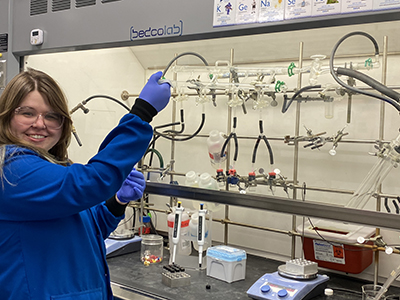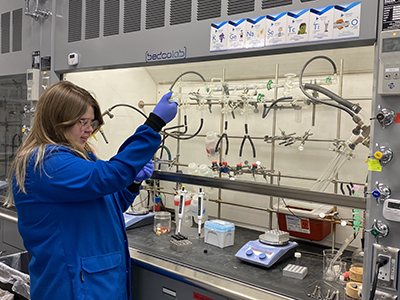Melissa Hardy - PostDoctoral Fellow in Sigman Lab
 BIOGRAPHY: "I am a postdoctoral researcher at the University of Utah, committed to combining
the study of organic chemistry and data science to lead to new solutions for public
health. I began my chemistry career in 2012 during my undergraduate studies at Grinnell
College in Grinnell, IA (Chemistry and French). In this time, I was a Goldwater Scholar
and completed multiple research experiences focusing on the synthesis of medicinally
relevant compounds. Following these studies, I moved to the University of California,
Berkeley for doctoral studies in Organic Chemistry. I worked with Prof. Richmond Sarpong
as an NSF Graduate Research Fellow and Chancellor’s Fellow.
BIOGRAPHY: "I am a postdoctoral researcher at the University of Utah, committed to combining
the study of organic chemistry and data science to lead to new solutions for public
health. I began my chemistry career in 2012 during my undergraduate studies at Grinnell
College in Grinnell, IA (Chemistry and French). In this time, I was a Goldwater Scholar
and completed multiple research experiences focusing on the synthesis of medicinally
relevant compounds. Following these studies, I moved to the University of California,
Berkeley for doctoral studies in Organic Chemistry. I worked with Prof. Richmond Sarpong
as an NSF Graduate Research Fellow and Chancellor’s Fellow.
My thesis focused on the synthesis of natural products of the pupukeanane family, a family of topologically complex sesquiterpenes which are of interest as new anti-malarial compounds. In my career, I hope to develop state-of-the-art solutions to accelerate the synthesis of biologically active molecules with the hope of bringing new medicines to market."
What motivates and inspires you?
I think the most inspiring part about scientific research is working with scientists in other fields (and other subfields of chemistry) to bridge the gaps in our knowledge. Collaborative work can be the most transformative and I’m always inspired by interdisciplinary applications.
What interests you most about your research?
I love that data science can be used to bring new insights to chemical reactions. Finding trends and patterns in available data is such an interesting way to make new discoveries that takes advantage of previously untapped information.
What do you wish you had known when you first came to Utah?
Invest in a good winter coat.
Your favorite University of Utah experience?
I love the easy access to the mountains and all the hikes available on campus. The university is full of awesome people ready for outdoor adventures.
What do you do for fun outside the lab? How do you handle stress? 
I think having a healthy work-life balance is key to handling stress. I love to cook and sharing my new creations with my friends.
What advice do you have for prospective postdocs?
Come to your new group ready to share what you know and open to learning more about your new research topics.
What is the biggest difference between life as a grad student and life as a postdoc researcher?
For me the type of research is very different! I switched from doing mostly synthetic work to mostly computational chemistry, so the daily work is extremely different and there is so much to learn at any given time. Another great thing about being a postdoc and switching laboratories is that your expertise and the expertise of the group you’re working can be much more orthogonal which makes for great experiences as a mentor and a mentee!
What do you plan to do after your postdoc?
I’m planning to continue work in computational chemistry and data science for the optimization and mechanistic understanding of organic reactions. I haven’t quite figured out what setting I’ll do this in, but I’m excited to see all the new research opportunities developing.
February 2023
